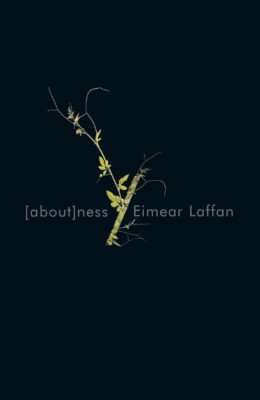We assess the art of storytelling in Eimear Laffan’s [about]ness, a long poem in sections that chronicles the creation of a text not yet completed. The breakdown of storytelling comes alive through visual poems and dynamic images. Theory and literary intertexts intersect as Laffan plays with structure and tangibility. Laffan’s poems are fragmented and metatextual, existing in a variety of forms – list, erasure, and prose poems combine to communicate an overall narrative of the self-referential poem finding its own meaning.
In the place of conventional line breaks and stanzas, the self-aware virgule is a constant guide through the bulk of the poem:

[about]ness
Eimear Laffan
McGill-Queen's University Press
$19.95
paper
88pp
9780228019022
“every I is a fiction finally,” writes Walcott / breaking
the line after “a” / how to represent this cut / in a
preponderance of virgules / this free fall into a future /
[choose your own adventure] // I would like my life to
submit / to the tidy of iambic tercets / it stalls before the
silk screen of language / if there were a procedure for
living / I would adhere
The visual is essential to [about]ness – the poem also often finds itself crawling up margins, inserting spaces in the middle of words, escaping from within brackets, blacked out, referenced in footnotes, and ending up in endnotes. Endnotes repeatedly interrupt the poem to direct the reader to later, shorter poems, manipulating the linearity of the text and the tangibility of the book. The dense text and oblique references may prove alienating for readers who are not as familiar with experimental poetics, but for those who are, the book is one to read and reread infinitely.mRb






0 Comments